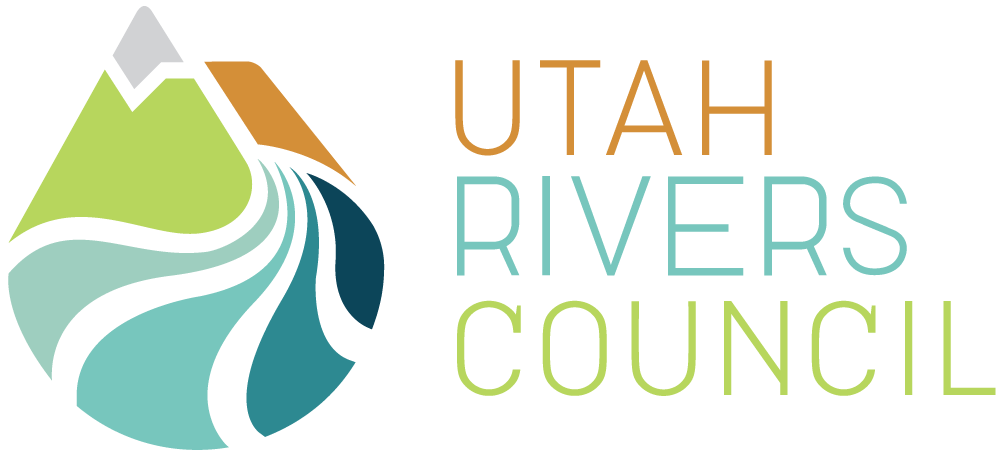America's Opportunity to Protect the Colorado River
Many people presume the proposed Lake Powell Pipeline is dead, because this bad idea comes during a megadrought on the Colorado River when millions of acre-feet of water cuts are being proposed downstream in three states. But Utah water officials have been working to acquire the right of way for the 140-mile long pipeline over the last few months. Just because it is a terrible idea, does not mean Utah government won’t move the project forward.
On December 18, the Utah Rivers Council submitted a coalition letter to the U.S Department of Interior asking that the Bureau of Reclamation eject the proposed Lake Powell Pipeline from its current permitting. The letter was co-signed by our wonderful partners, and can be seen here.
The decline of Lake Powell on the Colorado River showing high water (top) and low water (bottom) over the last 20+ years. The Colorado River has declined 20% in flows since 2000 and scientists predict that the climate crisis on the Colorado River is likely to get worse, not better.
The decline of Lake Powell on the Colorado River showing high water (top) and low water (bottom) over the last 20+ years. The Colorado River has declined 20% in flows since 2000 and scientists predict that the climate crisis on the Colorado River is likely to get worse, not better.
The Utah Rivers Council also launched a Change.org petition to ask Americans to join our coalition across the Colorado River Basin in calling upon the Bureau of Reclamation to eject the Lake Powell Pipeline from environmental permitting. The Provo Office of the Bureau initiated permitting in 2020, and the federal government needs to stop this folly once and for all. The multi-billion-dollar Lake Powell Pipeline is the largest new proposed water diversion in the Colorado River Basin and will impact millions of people across the region including inside of Utah.
Please join the Utah Rivers Council in calling for a sustainable and healthy Colorado River by signing our Change.org petition and sharing the link with your family, friends and community. Please note that Change.org will solicit donations for itself.
Your voice is crucial in this fight and will help determine what the future of the entire Colorado River Basin and ecosystem looks like.
Three Reasons Why The Lake Powell Pipeline Must be Abandoned
#1 The Colorado River is in an Environmental Crisis.
Climate change, overconsumption, and poor policies have created a crisis on the Colorado River – the lifeblood of the American West that supports 40 million people in seven states and Mexico. Water flows have declined 20 percent since the year 2000, and scientists predict that it will likely get worse in the future. Despite the public outcry about the health of the Colorado River, Washington County and the Utah Division of Water Resources continue to move forward on the Lake Powell Pipeline project.
#2 The Pipeline’s Proponent Admits the Water is Not Needed
The Lake Powell Pipeline would siphon 86,000 acre-feet of water annually from Lake Powell and pump it 2,000 feet uphill and across 140 miles of pristine desert to some of America’s highest per person water users in Washington County. The Pipeline is completely unnecessary for Utah’s future and threatens an array of existing water users inside and outside Utah. The Washington County Water District released a new water plan that showed they could meet their future water needs for the next 20 years without any water from the Lake Powell Pipeline. If the project’s primary proponent is admitting they do not need the water, why is the Bureau still permitting a water project which threatens so many other users across the region?
Proposed route of the 140-mile-long Lake Powell Pipeline, shown in yellow.
Proposed route of the 140-mile-long Lake Powell Pipeline, shown in yellow.
#3 Justification for the Proposed Lake Powell Pipeline is base on Climate Change Denial by Utah Water District Lobbyists.
The Lake Powell Pipeline began in 2006 when water district lobbyists convinced Utah legislators our state had a “surplus” of Colorado River water. This became the rallying cry for many Utah legislators who were happy to deny the reality of climate change and the requirements of Colorado River water sharing agreements. Some of these water lobbyists continue to promote this archaic notion, and it was even argued as justification for legislation in committee during the 2023 Utah legislative session. Several Utah water officials have openly warned Utah legislators that cuts to Utah’s share of Colorado River water are coming.
A mountain of peer-reviewed published climate science, alongside official statements from credible water agencies inside and outside Utah demonstrate there is no surplus Colorado River water for Utah. Research published from credible scientists demonstrates Upper Basin states are likely over-using their rights to Colorado River water, as summarized in the Utah Rivers Council’s 2021 Report. Both Utah and the Bureau of Reclamation need to accept that climate change is real, and the time for fantasy opinions about it being an unproven theory has long since passed.


